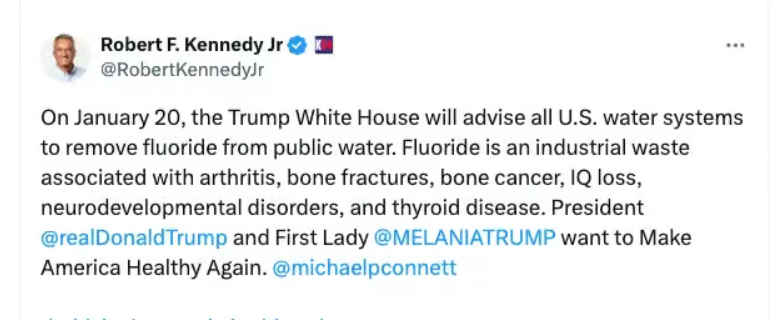Politico reports that RFK, Jr. plans to ban fluoridation, and the work is already underway.
Multiple news outlets repeated this story, yet none of them checked the evidence.
According to the CDC, adding fluoridation to water supplies was among the 20th century’s top ten public health achievements.
“a cornerstone strategy for prevention of cavities in the US It is a practical, cost-effective, and equitable way for communities to improve their residents’ oral health regardless of age, education, or income.”
The CDC states that fluoridated water keeps teeth strong and reduces cavities by about 25% in children and adults.
To validate this statement, the CDC refers to two studies. The first, is a meta-analysis of 20 studies. Eleven studies examined the effectiveness of self- or clinically applied fluoride, and of the nine that examined the effectiveness of water fluoridation none were RCTs, and all were cross-sectional studies. Also, the review, which wasn’t systematic, included adults and no children. The conclusion was limited to suggesting fluoride effectively prevents caries in adults of all ages.
The second study was a Cochrane review. Notably, most studies (71%) were conducted before 1975, when fluoride toothpaste was widely introduced.
The review concludes that little contemporary evidence evaluates the effectiveness of water fluoridation in preventing caries. The observational nature of the studies, the high risk of bias, and the lack of generalisability to current lifestyles limit confidence in the size of the effect estimates.
The review goes on to say that insufficient information exists to determine whether initiating a water fluoridation programme changes caries levels across socioeconomic status. No studies that met the review’s inclusion criteria investigated the effectiveness of water fluoridation in preventing caries in adults.
RFK, Jr. says he would advise the water districts using fluoridation that a lot of science still says safety studies still need to be done. RFK, Jr. considers fluoride an industrial waste. He also thinks a federal court ruling could speed up the end of fluoridation in the US.

A judge ordered the US Environmental Protection Agency (EPA) to undertake a risk assessment. Judge Edward Chen found fluoridation could cause developmental damage and lower IQ in children at the levels found in drinking water.
Following this judgment, four water systems, including Salt Lake City’s provider, have stopped or suspended fluoridation due to the ruling.
At the TTE office, we searched for updated evidence published in the last decade, including 32 reviews. A word of caution: the overworked staff at the TTE office is currently unable to assess the evidence fully.
Dental Caries
A 2021 review of ten studies on Brazilian populations reported that water fluoridation effectively prevents dental caries in children younger than 13 years, even with the widespread use of fluoridated toothpaste. A further review of fluoride for under-fives reports the evidence supporting oral fluoride supplementation for caries prevention is limited and inconsistent.
The WHO reports fluoride intake has both beneficial effects – in reducing the incidence of dental caries – and negative effects – in causing tooth enamel and skeletal fluorosis following prolonged high exposure.
Potential Harms
Reviews include an assessment of dental fluorosis, which affects individuals of all ages, with the highest prevalence below age 11. A further review reported that in 6-18-year-olds, at a water fluoride level of less than 0.7 parts per million, dental fluorosis occurred in 13% (95% CI: 7.5-18%) of the children. Above two parts per million dental fluorosis prevalence rose to 98% (95% CI: 96‒100%). In some regions, the amount of fluoride in the water represents a public health problem as it exceeds national and international regulation levels.
Reviews also assessed an association with hypothyroidism and children’s intelligence. Regarding neurological disorders, the evidence was inconclusive, and the authors call for epidemiological studies to provide further evidence regarding the possible association. A call for evidence that is repeated for establishing whether there is an association with Hip Fracture Risk.
Reviews have also assessed the potential correlation with increased blood pressure, association with chronic kidney disease, and risk of fluoride contamination in groundwater and its impact on the safety and productivity of food and feed crops.
The Impact of Stopping Fluoride
A systematic review, including six cross-sectional design studies, indicated that fluorosis significantly decreased following either a reduction in fluoride concentration or the cessation of adding fluoride to the water supply.
A systematic review of 15 studies identified methodological considerations for designing community water fluoridation cessation studies. These studies would permit an assessment of the effects of cessation on dental caries and the impact on reducing harm.
So, Where Does This Leave RFK, Jr.?
Beware of the swift condemnation of anyone who asks questions. Experts will espouse that fluoride is well-tested, it definitively or significantly decreases caries, and it has no association with any harm—all without reference to the evidence. Furthermore, the argument is lost when an individual who puts forward questions about healthcare exposures is referred to as a denialist.
RFK, Jr. rightly asks questions about an intervention based on evidence going back to the 1930s. In the meantime, there have been growing concerns about harm and little contemporary evidence evaluating the effectiveness of water fluoridation in preventing caries. So, stopping fluoride in the context of epidemiological evaluations isn’t far off the mark.
This post was written by two old geezers who regularly clean their teeth, and remain overworked and apolitical.
By Prof. Carl Heneghan and Dr. Tom Jefferson.
Image credit: Lia Bekyan

Auckland’s tap water is sour and metallic to the point where I can barely finish a full glass. God only knows what’s in it
Don’t drink the corporate states kill you slowly medication straight from the tap.
Arsenic? Doesn’t Auckland get its water from the Waikato river?
Who ever decided we need fluoride should be held accountable.
Follow the money who is paying for this besides taxpayers.
Are people getting paid off ?/
By the chemical companies or all the filtration companies as their businesses will be going off the rails.
Time to by their shares
Thanks to the 2 old geezers for giving the Daily Telegraph another fine article!
I am all for the cessation of mass dosing of fluoride in our drinking water for the obviously erroneous claims of benefit to dental health. What about all the people that have dentures and no teeth, how does that benefit them and why must they be ‘dosed’? Why can’t people who want it simply choose to use fluoride toothpaste or get a fluoride treatment from their dentist?
I really dislike this knee jerk tick box approach of big pharma medicine where everyone is dosed and treated like short lived farm animals.
EXACTLY